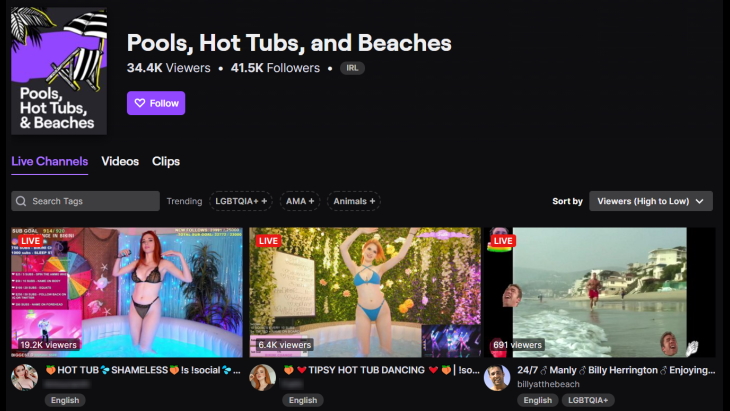
Twitch have announced the launch of their Pools, Hot Tubs, and Beaches category; and that “being found to be sexy” was not against the rules.
As Twitch has grown into categories outside of gaming; such as Just Chatting, Talkshows & Podcasts, and Music, some users have been concerned about the focus shifting away from gaming. The largest of these concerns are the infamous “Twitch thots.”
Twitch thots are female streamers dressed provocatively or performing sexual or highly suggestive acts. Being borderline “cam-girl” content, many have criticized both the performers, and Twitch moderators for being inconsistent with their moderating (such as allegedly banning users for less sexual content in a video game, while the top streamers are gyrating or “body painting”).
Fans of these streamers have even been condemned as “simps.” The term typically means a desperate and isolated single man, desperately acting submissive and “supporting” to a woman in order to gain a relationship or sex; such as gifts, giving money, or favors beyond that expected of a stranger. The Twitch thots have also been accused of encouraging simps to donate, and encouraging their delusion.
Twitch would update their policies related to “Nudity and Attire” and “Sexually Suggestive Content” in early April 2020; and in December 2020 banned derogatory language based on an individual’s “perceived sexual practices,” sexually-focused terms, and emotes based upon them. Twitch COO Sarah Clemens specifically mentioned the words simp, incel, and virgin as an insult would not be allowed.
In recent months however, some these Twitch thots and others had begun streaming from within paddling pools, swimming pools, and hot-tubs; while wearing a bikini. Many criticized this as yet another flagrant breaking of the rules (if only in spirit), and yet again accused Twitch of prioritizing the money these performers generated. In an statement on Twitch Blog however, it seemed these streamers would not only remain; but have their own category.
After emphasizing the matter “brings up questions that are complex with few easy, clear answers,” was approached “thoughtfully and respectfully,” and “given the nuances;” the decision making process and post itself were long.
Firstly discussing the “assumptions about their motivations and intentions,” Twitch made it clear that “no one deserves to be harassed for the content they choose to stream, how they look, or who they are, and we will take action against anyone who perpetuates this kind of toxicity on our service.”
Twitch further defended some of those user, stating “while we have guidelines about sexually suggestive content, being found to be sexy by others is not against our rules, and Twitch will not take enforcement action against women, or anyone on our service, for their perceived attractiveness.”
Continuing, Twitch explains that under their Nudity & Attire and Sexually Suggestive Content policies; streamers can be in swimwear in “contextually appropriate situations” and that they “allow creative expression like body writing and body painting, provided the streamer has appropriate coverage as outlined by our attire policy.” Nonetheless, Twitch state “Nudity or sexually explicit content (which we define as pornography, sex acts, and sexual services) are not allowed.”
Admitting the Sexually Suggestive policy was “not as clear as they could be;” it was to handle content that was overtly or explicitly sexually suggestive, rather than ban all content that could be deemed as sexually suggestive.
“Prohibiting every form of content that could be interpreted as suggestive” would run the risk of far more restrictions on video games and premium content; “especially considering the ways that female characters are sometimes objectified or presented in a sexualized manner.”
To avoid being overly punitive, and that sexually suggestive content can be subjective, Twitch had acted when content was in blatant violation of their guidelines. Policies on sexually suggestive content will be updated in the coming months.
Seemingly prompted by calls to have Twitch thots have no advertisements play on their stream, Twitch explained that brands can decide where and when their ads will appear; such as avoiding specific categories and flagging channels to avoid.
While Twitch stated they “absolutely do not permit brands to use protected characteristics as a filter for advertising targeting or blocking;” they had “recently suspended advertising on some channels that were flagged by the majority of our advertiser base and failed to notify them [the streamers].” Twitch are working with those streamers to “address their specific situations and restore ads where appropriate.”
As they recognize their “diverse, global community has a broad range of interests and preferences;” Twitch announced the launch of the Pools, Hot Tubs, and Beaches category; seemingly to help users who wanted to avoid them.
This also lets users flag the category as “not interested,” without condemning the Just Chatting category (which some users use for portions of their stream before playing a game). The above image was taken at this time of writing, indicating that users may have some indication from a stream’s thumbnail of the content therein.
Along with the aforementioned updates to the sexually suggestive policy, Twitch explain they will help “provide creators with a better understanding of what ‘brand safe’ means to advertisers outside of our Community Guidelines and Terms of Service.”
“This is not intended to be our long-term solution to improve brand targeting capabilities and increase personalization in our recommendations. It does, however, solve a few issues for all audiences in the near term. Creators can continue to stream content that falls into this category as long as it doesn’t violate our guidelines. Viewers can better avoid recommendations for content that they don’t want to see, and those wishing to view this content will have an easier time finding it. And brands can either opt-in or -out of this category based on whether it aligns with their target audiences, like they can today with any other category.”
What do you think? Sound off in the comments below!
Image: Twitch